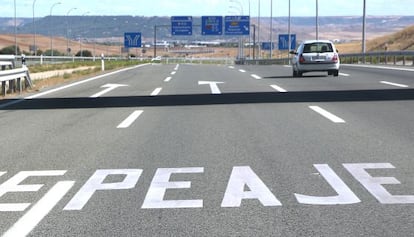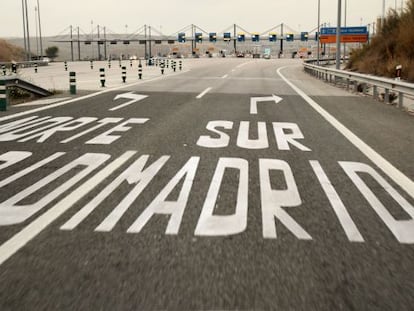Spanish taxpayer to foot €5 billion bill for failed privately run toll roads
Public Works Ministry says it’s too late to reach a deal with creditors
Spanish taxpayers will pick up the tab when the government nationalizes nine loss-making privately managed toll roads, Public Works Minister Íñigo de la Serna said on Monday. The announcement follows more than two years of talks between the government, the operators of the highways, and creditor banks. “An agreement to settle this is difficult, because many banks have already sold their debt on,” De la Serna told state television.

No official figures are available regarding the scale of the highway operators’ debt and the cost of nationalizing them. Seopán, the Spanish construction industry’s confederation, put the figure at around €5.5 billion in 2015.
De la Serna said he believed the roads could be made profitable in the long term.
Spanish courts have called for the highway operators to be put into liquidation
The banks that lent money to the highway operators are owed a total of €3.4 billion. But a number of these institutions, notably foreign players, have already sold their debt on to so-called “vulture funds.”
“The highways will revert to the state and the state will decide how to manage them,” said De la Serna on Monday morning, highlighting the importance of keeping the roads open.
He added that he would be reviving a plan announced in 2014 by his predecessor that involves creating a 100% state-owned company to bring together nine toll roads after writing off 50% of their debt. Under the deal, creditors would receive a negotiable 30-year bond.
The highway operators have already provisioned for their losses with the money invested in the roads, which were financed in large part with loans from around 20 banks.
The government believes the toll roads can make a profit
The state is now obliged to take over the struggling concessions because it acted as a guarantor when the private companies took out loans. The investment that was required to expropriate adjoining land and build the roads was expected to be recouped through long concessions. But the economic crisis and the existence of nearby toll-free roads covering the same routes has meant that few drivers were willing to pay the premium to use them.
Four of the nine concessions are the R-2, R-3, R-4 and R-5 ring roads that provide access to the radial routes out of Madrid to Barcelona, Valencia, Andalusia and Portugal, run by a consortium headed by Abertis, ACS, Sacyr and Bankia. The M-12 is a link to Barajas airport, the AP-41 connects Madrid with Toledo, while the AP-36 is a ring road round Alicante run by Ciralsa. The last route is part of the AP-7, between Cartagena and Vera, which is managed by Aucosta.
Spanish courts have called for the highway operators to be put into liquidation, as happened with the R-3 and the R-5. The Public Works Ministry has succeeded in delaying any such move until July 2017 to avoid road closures.
English version by Nick Lyne.
Tu suscripción se está usando en otro dispositivo
¿Quieres añadir otro usuario a tu suscripción?
Si continúas leyendo en este dispositivo, no se podrá leer en el otro.
FlechaTu suscripción se está usando en otro dispositivo y solo puedes acceder a EL PAÍS desde un dispositivo a la vez.
Si quieres compartir tu cuenta, cambia tu suscripción a la modalidad Premium, así podrás añadir otro usuario. Cada uno accederá con su propia cuenta de email, lo que os permitirá personalizar vuestra experiencia en EL PAÍS.
En el caso de no saber quién está usando tu cuenta, te recomendamos cambiar tu contraseña aquí.
Si decides continuar compartiendo tu cuenta, este mensaje se mostrará en tu dispositivo y en el de la otra persona que está usando tu cuenta de forma indefinida, afectando a tu experiencia de lectura. Puedes consultar aquí los términos y condiciones de la suscripción digital.









































